
The Fortune Brainstorm Health 2022 conference brought together forward-thinking and insightful leaders in health care, technology and business to “brainstorm” how to drive meaningful change across the health care landscape.
Cigna Chairman and CEO David Cordani, and Arianna Huffington, CEO of Thrive Global, had one of the most noteworthy discussions, touching on worsening mental health among teens, the promise of pharmacological innovation, virtual care and the profound power of micro-communities. Watch their discussion below.
Below, we take a look at five big takeaways from their discussion.
1. Mental Health and Physical Health are Connected
We have tremendous opportunities when we treat the whole person, Cordani said, recognizing that mental health and physical health are inextricably linked. Cigna has developed data-driven insights over many years.
Long before mental health was at the top of the talk track for most businesses – Cigna data determined that someone surviving a heart attack had a high probability of being clinically depressed after the heart attack. Data also shows that if the clinical depression is diagnosed and treated, the probability of a second heart attack is very low. Responding to this trend, Cigna integrated behavioral health services into its coronary chronic care management, and now the teams work together, providing more coordinated care, one patient at a time.
The evidence is strong pointing to the connection between mental and physical health, and Cigna will continue to use data to roll out new, predictive, and innovative care solutions while making the patient experience more seamless, easier, and convenient.
2. Teen Mental Health Takes a Toll on Parents at Work
Cordani announced brand new research by Economist Impact, commissioned by Cigna Corporation and Evernorth, which looks at the mental health impacts of the pandemic on teens and the effects on parents. The research suggests that increasing teenage mental health struggles can rapidly become a growing workforce issue.

Mental Health Impacts of the Pandemic on Teens
New research by the Economist, commissioned by Cigna, has found that the increase in mental health issues among teens is having an impact on their parents at home and in the workplace.
According to the research, nearly one-fifth (18%) of working parents report that their teenager’s emotional state has a negative impact on their job performance and productivity. What’s troublesome is that 55% of these concerned parents report not having enough support from their employer, and one in seven employees report having to leave the workforce or stay out of the workforce to care for their teenagers’ needs.
“If an employee is dealing with mental health challenges with a child at home, they will likely need more flexibility and support from their employer,” Cordani said, adding that companies must step up and support the health and well-being of employees and their families, and that every organization today is in the business of health care in that sense.
3. There are Three Major Forces Shaping the Health Care Landscape
Cordani said that there are three major forces of change shaping health care. The first is pharmacological innovation, which is bringing powerful new treatments and cures, as well as new opportunities to manage challenges with affordability such as with greater adoption of biosimilars.
The second trend is broader acceptance of this notion of whole-person health—the mind and body connection – and that taking care of both helps people reach their full health potential.
Finally, he said, the shift to alternative sites of care, as well as harnessing technology and data, can help dramatically improve a patient’s experience by delivering care in a much more real-time, highly personalized and coordinated way.
4. Virtual Care is a Means of Extending Physicians, not Displacing Them
Cigna acquired MDLIVE in 2021, adding the virtual care technology platform to its Evernorth suite of health services. Today, Cigna customers who are enrolled in employer-sponsored plans have access to MDLIVE's network of virtual primary, urgent, behavioral and dermatology care for routine care visits, sick visits, prescription refills, or to follow up on a condition that was not addressed during a wellness visit.
Utilization of the platform continues to grow, Cordani said, emphasizing that virtual care is not meant to replace in-person care or disintermediate the patient-provider relationship. Instead, virtual care will complement in-person care.
5. Micro Communities Can Change People’s Lives
We can all use a little help sometimes. A micro-community of two to three people can be really impactful, Cordani said. Many times when a person is dealing with a health crisis, or working to achieve a specific health and wellness goal, support and help from their micro-community is paramount. According to Cordani, it doesn’t need to be a large ecosystem of individuals providing this support.
“That micro community could achieve things that people didn't think was possible,” Cordani said. In fact, the most resilient people often have a strong support network. According to the Cigna Resilience Index, people who have a strong sense of community and support from family, friends, teammates, and peers often report higher levels of resilience because they can readily activate their network for support when and where needed.
For more information on Cordani’s fireside chat at Fortune’s Brainstorm event, click here.